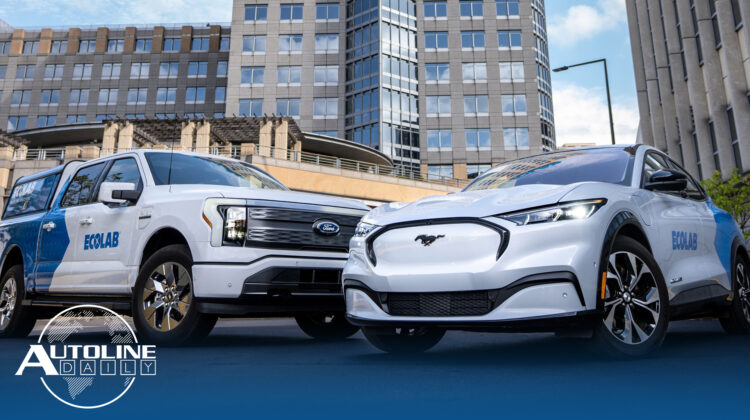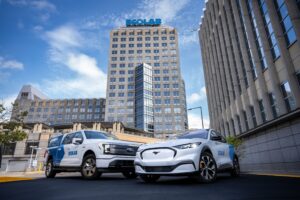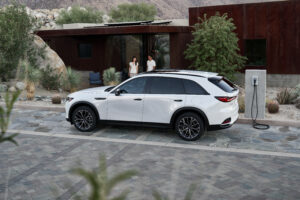
Follow us on social media:
Runtime: 10:51
0:00 GM Posts Solid 2023 Earnings
1:01 GM Suggests U.S. EV Sales Could Hit 1.6 Million
1:33 Renault Axes Ampere IPO
3:00 EV Chargers Can’t Get Installed Fast Enough
4:05 Republicans Demand Investigation Into Ford/China Relationship
5:28 CATL Growth Slows, Loses Market Share
6:19 Ford Reveals All-New Transit Connect
7:27 EcoLab Buys a Bunch of Ford EVs
7:57 Peugeot Offers 8 Year/100K Mile EV Warranty
9:00 Mazda Shows New 2-Row Crossover, the CX-70
Visit our sponsors to thank them for their support of Autoline Daily: Bridgestone, Intrepid Control Systems and Teijin.
This is Autoline Daily, the show dedicated to enthusiasts of the global automotive industry.
GM POSTS SOLID 2023 EARNINGS, DESPITE UAW STRIKE, CRUISE PROBLEMS
General Motors reported its earnings for 2023 and it showed improvements despite the UAW strike and continuing losses with its electric and autonomous vehicles. GM brought in $171 billion in revenue, which was up 9.6%. Its earnings before interest and taxes, or EBIT, came to more than $12 billion, but that was down 14.6%. It posted a net profit of $10.1 billion, which was up almost 2% from the year before, but its net profit margin was only 5.9%. GM continues to struggle in China, where its income came to $446 million, down a sharp 34%. Even so, GM is fairly bullish on how it will do in 2024. It boosted its guidance on revenue, profits, cash flow and earnings per share.
GM SUGGESTS EV TOTAL SALES COULD HIT 1.6 MILLION THIS YEAR
One interesting tidbit from CEO Mary Barra’s letter to shareholders is that GM expects to post a variable profit with its EVs in the second half of the year. She also expects total U.S. EV sales to hit 10% market share, and since GM is forecasting that new vehicle sales in the U.S. will top 16 million units, that suggests Americans will buy about 1.6 million EVs in 2024, up from about 1.1 million last year.
RENAULT AXES AMPERE IPO
Renault is no longer spinning off its EV and software division Ampere. It first said it was going to do an IPO with Ampere in 2022, but it’s been delayed several times since and now Renault says due to current market conditions it’s not in its best interests at this time to go forward with the process. It doesn’t think Ampere will hit its breakeven point until 2025, so it will continue to fund the development of the division on its own. Renault claims it’s been doing better than it expected and has been able to generate enough money to finance its future, including Ampere. Those future endeavors include reducing EV costs by 40%, developing software and AI solutions and launching 6 new EV models; the Scenic, Renault 5, Renault 4, Twingo as well as 2 additional cars. So far the legacy automakers aren’t making any money on their EV and software divisions, which requires a lot of investment as well. So, this could be seen as a good move. But we’ve also been told by industry experts that the legacy automakers are behind on their EV and software development and this could slow Ampere down even more. So, it doesn’t sound like an easy balancing act, but the ones that do it the best will have the best chance for success.
DEMAND FOR EV CHARGERS GROWING FASTER THAN THEY GET INSTALLED
While EV demand is slowing, EVs still represent the fastest growing segment in the market. And because of that growth, ChargePoint says demand for EV chargers is growing faster than they can be installed. Last year, ChargePoint says there was a 53% increase in annual charging sessions across its network globally. That resulted in over 1 Terawatt hours of energy being dispensed, a 70% increase. ChargePoint has 274,000 ports worldwide and in the third quarter of 2023, it passed 1 million active users globally. ChargePoint says this data shows the need to continue to build out the charging network to keep pace with demand.
REPUBLICANS DEMAND INVESTIGATION INTO CHINA-FORD RELATIONSHIP
Ford’s planned EV battery plant in Michigan with Chinese battery maker CATL is drawing more scrutiny from Republican lawmakers. Last September, Representatives Mike Gallagher and Cathy McMorris Rodgers, who chair two committees in the U.S. House, demanded documents from Ford over its partnership with CATL and even threatened to force CEO Jim Farley to testify before Congress. They claim they’re concerned that U.S. tax subsidies will go to Chinese companies and that Ford will become reliant on Chinese technology. Now Reuters reports the same Representatives sent a letter to the Biden Administration asking it to investigate four Chinese companies involved in the deal. They claim the companies have ties to the Chinese military, Chinese Communist Party, North Korean government and alleged human rights abuses in China’s Xinjiang region. The companies were not named in the letter because they’re not allowed to be made public. In response, Ford says it follows “all government regulations across our business” and it also says the battery plant is “wholly owned and operated” by the company. And this ordeal indicates to us that EVs are going to be a big part of this year’s presidential election.
CATL GROWTH SLOWS, LOSES MARKET SHARE
And if this isn’t a big enough headache for CATL, the battery maker is also dealing with weaker demand. The company said it expects a net profit in 2023 between $5.9 and $6.3 billion, up 48% from the year before. And while that’s incredible growth, it’s significantly below the 93% net profit gain it posted in 2022. And not only are its profits slowing, CATL is losing market share in China. Last year, it had 43% of the market, down from 48% in 2022. Meanwhile, BYD and CALB, the number two and three EV battery producers in China, saw their combined market share grow from 30% in 2022 to about 36% last year.
FORD’S ALL-NEW TRANSIT CONNECT
Ford revealed the all-new Transit Connect for Europe. One of the big additions is the model’s first ever plug-in hybrid powertrain. The turbocharged 1.5L engine, which pairs to a 6-speed automatic transmission, combines with an electric motor to produce around 150 horsepower. Ford doesn’t say how big the battery is, but it must be decent sized because it’s targeting a range of up to 110 kilometers or about 68 miles. A 2.0L turbodiesel engine that comes in two power outputs is also available. Possible combinations include FWD, AWD, a 6-speed manual or 7-speed automatic transmission. Both long- and short-wheelbases and 2- or 5-seat body styles are available as well. And the 5-seat version, which Ford calls Kombi, has a trick second row that folds up and allows owners to carry around more people or quickly convert into a work van. Ford says orders kick off in the spring and buyers can expect delivery by the summer.
ECOLAB BUYS A BUNCH OF FORD EVs
Speaking of Ford orders, EcoLab, which makes water, hygiene and infection prevention solutions, is buying over 1,000 Lightnings and Mach-Es to add to its fleet by the end of next year. EcoLab and Ford already have a pretty strong history. EcoLab has over 10,000 vehicles in its total fleet, 95% of which are Ford vehicles and over the last 10 years its bought more than 31,000 Ford models.
PEUGEOT OFFERS 8 YEAR/100K MILE EV WARRANTY
Some car dealers are worried that as more EVs hit the road they’ll see fewer repair bills because EVs require less maintenance. But Peugeot is testing out a new warranty program for the all-electric E-3008 that looks like it’s intended to make sure the dealer gets as much of that repair work as possible. It’s offering what it calls Peugeot Allure Care, which covers the electric motor, charger, powertrain, and the main electrical and mechanical components for up to 8 years or 160,000 kilometers or roughly 100,000 miles. It already offers that same warranty on the battery. But the Peugeot Allure Care coverage is automatically activated for 2 years or 25,000 kilometers only after each maintenance service is done within the Peugeot Network. The company thinks this will help accelerate EV adoption, so it’s possible it could spread to other models and brands.
MAZDA REVEALS NEW 2-ROW CROSSOVER
Mazda is officially unveiling the CX-70 crossover in the U.S. market today. It sits on the same platform as the CX-90 and even has the same wheelbase. So, it’s essentially the 2-row version of the 3-row CX-90. By removing the third row of seats, Mazda greatly increased the luggage space and is really targeting customers who want to be able to carry more things. Like the CX-90, this rear-drive CUV is powered by an in-line turbocharged 6-cylinder engine, or there’s an optional plug-in hybrid version as well. We don’t have pricing on the CX-70, but the CX-90 starts at about $40,000, while the PHEV is closer to $50,000. We expect the CX-70 will be priced a bit lower than that and we should have those numbers soon.
But that brings us to the end of today’s show. Thanks for making Autoline a part of your day.
Thanks to our partner for embedding Autoline Daily on its website: WardsAuto.com








That’s a great idea by Mazda, selling what is, essentially, a CX90 without the 3rd row. I wish Toyota sold a two row Highlander hybrid. I’ll never use the 3rd row, and the space where it folds could be used for a nice, under floor storage compartment.
Kit, I have often wondered about that with three row SUV’s. Manufacturers seem to spend lots of money for minimal drops in weight, yet ignore such an obvious solution. That third row of seats has to weigh plenty.
It’s interesting how people don’t want US companies to give away intellectual property to China, but don’t want US companies to receive intellectual property from China either. Yeah, the thing with Ford/CATL is all political.
BobK, the 3rd row of the Highlander, and I think also the CX-90 is only suited for for small people, or very short trips for adults. I suspect a lot of buyers never use it. The companies want so simplify build options, so most companies make the 3rd row mandatory, if they offer it.
35 years ago when I ordered my Dodge Caravan, you could get them either two or three row, and I got mine two row. For decades, the remaining minivans have been sold only with three rows, except maybe oddballs like Transit Connect and Promaster City. The passenger versions of those may be three row.
I think partnering with top quality Chinese EV battery companies is a good idea. OEMs will learn the battery manufacturing business just like the Chinese learned the auto manufacturing business by partnering with legacy OEMs.
I think mini vans have such a poor style reputation that manufacturers automatically stuff a third row in so families can justify the SUV over a van, expecting that it will not be used frequently. The few that don’t want the third row are caught in the low volume, keep it simple conundrum.
I bet even Mazda in a year or two will add a third row to the CX-70. They can’t help it.
I have a vehicle that should have the 2nd row as an option, a 2-door Mini Cooper. The back seat will never be used, and it adds weight and takes up what could be cargo space.
Ford forming partnerships in the US with Communists nations should be a no no! No more Fords for me.
why dont these idiots make the ford transit connect available for sale in north america?
the plug in hybrid transit connect. thats more all electric range than a chevy volt.
joe — You have the right to how you feel and your choices and we all respect that. I ask you, though, what about Apple who builds their phones in China and their batteries? What about most of the TVs and other electronics devices that are used in the US and around the world that have been built and assembled in China? There are a lot things we use everyday, even some paint pigments that come from China, from other OEMs along with Ford and manufactured products from ink pens, kitchen appliances, tools, etc. China’s offenses have been well documented and taking a stand and holding them to account for their actions have been the call of many! The batteries that Ford planned to use from CATL is just the tip of the iceberg, though, of items should one choose to boycott products originating from that country. It’s just interesting that the political focus is on an OEM, that it’s union has thrown its support behind a political rival, but their are other companies that are just as culpable as Ford is accused of being! That said, choosing to boycott Ford and only Ford is your too.
I won’t be buying a Ford, not because they are partnering with CATL for batteries, but because they no longer sell cars in the US except Mustang, and I already have more sporty cars than I need. Also, they are dropping the most appealing CUV they have to me, the Escape hybrid.
As far as Ford and CATL et al, I welcome the change of bringing some expertise this way from China, rather than the other way around.
“Rock fall on egg, egg break.
Egg fall on rock, egg break.”
China planned their own competitive advantage into the auto manufacturing partnerships.
I assume China has planned the same for battery partnerships in the USA.
Is the USA vigilant?
I saw the compact MG electric car here in Switzerland a couple of days ago, and it looks great – much better than on the pics. The color was a satiny olive green, very nice. I wonder when Tesla will start offering some real choice, the super modern paintshop in their ‘Berlin’ plant was once said to enable that.
Rick- Fully agree, it’s hard to fathom why they cancelled the North American Transit Connect. The C2 based design work was done and it would have been built alongside the other C2 Maverick/Bronco Sport variants in Hermosillo. The only reason I can think of is they didn’t want to take capacity away from the hot selling Maverick, but it sure seems like a miss for the Pro customers.
QCX, the Promaster City has been dropped in the US too. I thought both Transit Connect and Promaster City made a lot of sense for plumbers and other trades people to move stuff around. I guess neither sold very well in North America.
Kit-wbm- The problem I have with sharing intellectual property with China is that they exploit that property with no repercussions. They have blatantly made knock off products typically of lesser quality and sold those products that would be an open and shut case in a patent infringement case if done most anywhere else.
Doing business with China to me is like making a deal with the devil. It will come back to bite you in the end. Our automotive industry is about to learn as they will pay the price of the few million cars they sold in China partnering up and teaching them how to make cars. Now they have the skill and knowledge and will use that to eat our lunch as they soon will flood our shores with cheap EVs that will likely outsell even Tesla.
People are too short sited to see the long-term ramifications. We made some great money as China developed an auto industry. Now we will pay the price.
We exploited Mexican labor then India, North Korea, Ukraine and China all to get a break in labor. The difference was China was the only country smart enough to require a partnership. They were looking ahead not just for the immediate boost in jobs. But how they could eventually do the whole thing alone. Well, they did.
I liked that the US was one of the best countries to live in, but when you’re on top you have nowhere to go but down. A global economy and free trade is a step toward a level playing field meaning you take the global average pay and benefits for your job and that’s what your future holds. We have laws and rules and regulations to deal with in the US and China doesn’t play by those same rules. All the costs associated with meeting OSHA, and EPA regulations and all other gov requirement as well as safe and fair labor practices isn’t part of a products cost coming out of China. So, I have a big problem with China products and avoid them when I can. Sadly, so much is already here often times I don’t have a choice.
Lambo, you hit the nail on the head!
JoeS
There is a non-Chinese alternative for smart phones. Most Samsung phones are from Vietnam.